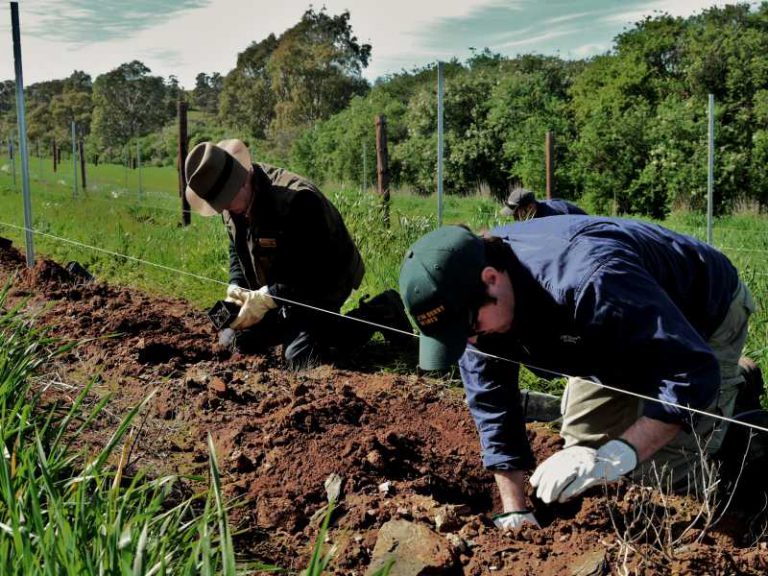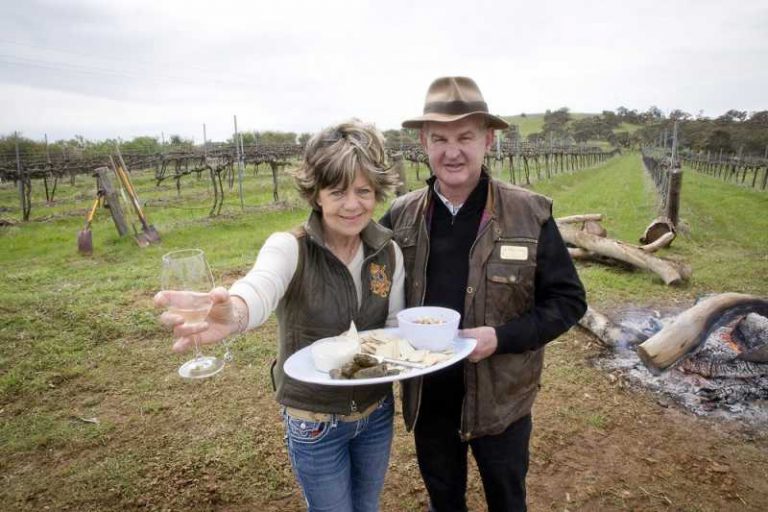Peter Barry remembers the exact date he tasted assyrtiko. “It was on the 28th of August in 2006, in Santorini,” he affirms. “I put it in my diary, that I tasted the native wine. I was on holidays with my wife Sue at that moment. I was at a restaurant, by the beach and I told the waiter to bring me the wine that the chef drinks. Because the chef can’t open one of the expensive bottles, but he always drinks the best bulk wine.”
It’s great getting the tips of the trade, especially coming from the mouth of such an experienced winemaker − Peter Barry, after all, is the head of Jim Barry Wines, the company that has played an instrumental role in establishing Clare Valley as one of Australia’s leading winemaking regions. What is even greater is to hear him describe how this accidental discovery affected him.
“I fell in love on holidays,” he says. “There was a flavour that I’d never tasted before. It was smoky and it had a minerality and a kind of saltiness that I’d never experienced in a wine before. It was fascinating for me, almost like being deaf and then, all of a sudden, you can hear music.”

From then on began a persistent quest; “It was a double-headed approach,” he says. “The wine that I tasted in Santorini made me terribly interested in what Greek winemakers were doing, but also in this particular variety. So the following year, I went to the London Wine Fair and spent some time in the Greek area, tasted all of the winemakers; I tasted everybody’s wines, 15-20 producers, and assyrtiko kept standing out”.
That’s when the idea of the variety ‘migrating’ to Australia emerged in his head.
“When I returned to Australia, I tried to get some cutting, but there weren’t any in Australia, so I had to fly back to Santorini and collect cuttings myself and bring them through quarantine to Australia.”
This sounds like a lot of trouble, but Peter assures us that it is a routine process. “It is complicated, but it wasn’t the first time it had been done − many cuttings have been brought to Australia before”.
Still, assyrtiko grows mainly in Santorini, and it is hard to separate the wine from its ‘terroir’, due to the volcanic soil, which is hostile for the phylloxera.
“When it devastated Europe, this didn’t happen in Santorini, that’s why it is one of the oldest winelands in the world,” he says.
This little history lesson underlines the significance − and risk − of transplanting the variety to a different soil. The winemaker acknowledges the challenge, in an almost dismissive way: “It’s just an adventure, isn’t it?”
He’s talking about this kind of dealing with the unknown; tasting a wine on the other side of the world and wanting to grow your own. “You don’t know if it will work, but that’s what makes life interesting, the challenge to try something”.
Having said that, he explains that his dream was not “to replicate Santorini”, but to honour the variety by making the first Australian assyrtiko.
“We’re very good winemakers, we’re very successful, winning trophies and gold medals in white wine,” he says. “We just do our best and see what we can do”.

This remains to be seen. On Tuesday 8 November, Jim Barry Wines launched its assyrtiko for the first time, in a celebratory event, a long lunch in one of Melbourne’s best establishments, much to the enjoyment of the industry leaders who attended. Now it’s time to bring it to the public, but the Barry Assyrtiko will not be sold in bottle shops. It will be found only in restaurants, or − for those who want to enjoy it at home − through the Jim Barry Wines website.
“We’ve not sold a bottle before,” says Peter. “The first year we made only 15 litres so we put them in 45 little bottles; the next year we made 100 dozen but we didn’t sell them. We’re taking baby steps. We don’t know how this wine will age, we don’t know its ageing potential in Australia, so of course we need to put a certain amount of wine in a museum and in 30 years, my children will open it to see how it changes in character through time.”
Among those who tasted the Australian assyrtiko and gave their stamp of approval are the Greek Masters of Wine who recently visited the country.
“They verified that it tastes like assyrtiko,” says Peter, obviously proud of the end product. “I like very dry, crisp wine, personally, and this is exactly the kind of wine this variety makes. It is wine with a savoury character, that goes very well with food. You want to have a glass of wine that refreshes your palate.
“Greeks have very savoury cuisine, and this kind of dry white wine is perfect to cut through the lamb fat, say. It’s very similar to our rieslings; we’re famous for making dry riesling. The difference is that assyrtiko has more of a mouth feel, it is more textural in the mouth. That’s interesting for us. Everyone has chardonnay and sauvignon blanc and pinot gris.”

As an experienced producer, does he agree that lately there’s a trend diverting taste from dry wine and favouring sweeter ones?
“There’s always a trend,” he says. “To make things sweet means to attract new, young customers; the young customer who has a cup of tea with two sugars. It’s only later in life that you become more sophisticated and appreciate some flavours,” he explains, and then deadpans: “I’m nearly 60, so there’s no point in attracting me to wine”.
This attitude summarises the unconventional Barry approach to marketing: “We make the style of wine we do best and the people who like it will find us and become loyal.”
So far, this strategy has served the Barry family well for three generations now.
“I was lucky to be born into wine”, says Peter Barry, who has passed on the torch to his sons. “It’s a mix of agriculture and science; it’s very fascinating.
“Every day, I look forward to going to work. Every day, we can make wine as a living cultural enjoyment. And the wonderful thing is that I can open a bottle of wine I made 30 years ago and listen to the music I listened at the time; I can travel in time and think about my youth. I’m a very lucky person,” he says, describing the meaning of it all in a few words: “Wine, food, friends and family; these are the things in life.”
* Anyone wishing to order the first Australian assyrtiko can do so by visiting www.jimbarry.com/









